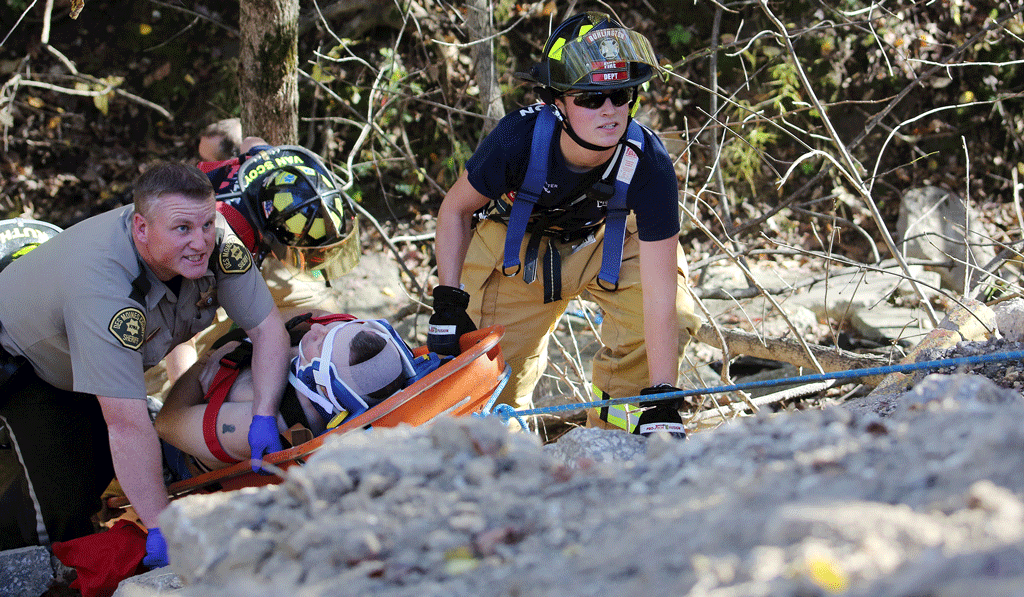The second hardest job in the world, according to CareerAddict, is being an astronaut. What job could there possibly be that’s even harder than working in outer space? Answer: firefighter. Let’s take a look.
According to the National Fire Protection Association, there are over 1.1 million firefighters in the United States, comprised of both career and volunteer workers. The job is an arduous one in terms of training and a hazardous one in terms of duty. There are tens of thousands of firefighter injuries each year and, in 2015, 68 on-the-job deaths. Firefighters are at the station or on call 24 hours a day and respond not just to fires but also to medical emergencies and hazardous materials crises. And they do this year after year.
Firefighters may not be fearless, but they are remarkably adept at overcoming personal fears in order to rescue us and our property with courage and skill. Who can forget the events of 9/11 and the images of firefighters going into burning towers in New York City? So many brave firefighters were lost that day. For good reasons, firefighters are widely admired and appreciated by society.
 Unfortunately, like other people groups addressed in our blogs, firefighters incur many other secondary consequences in addition to the direct hazards of performing their duties Significant stress comes with the job of a firefighter. In fact, firefighting is not only considered the hardest job, but also the most stressful one. And stress can contribute to physical and mental health problems, professional burnout, communication and marital issues, substance abuse, and suicide. Perhaps as many as one third of our Nation’s firefighters display symptoms of post-traumatic stress disorder. Compared with national averages, firefighters have higher rates of divorce, alcohol use, binge drinking, several forms of cancer, and suicide. According to the Centers for Disease Control and Prevention, the suicide rate for firefighters is one of the highest of all professions in the Nation. Furthermore, the highest suicide rate among females occurred in the firefighter and law enforcement professions. Sadly, according to the Firefighter Behavioral Health Alliance, 97 firefighters committed suicide in 2016 and this number is trending upward. This means that despite the hazardous environment, more firefighters are dying because of suicide than work-related incidents.
Unfortunately, like other people groups addressed in our blogs, firefighters incur many other secondary consequences in addition to the direct hazards of performing their duties Significant stress comes with the job of a firefighter. In fact, firefighting is not only considered the hardest job, but also the most stressful one. And stress can contribute to physical and mental health problems, professional burnout, communication and marital issues, substance abuse, and suicide. Perhaps as many as one third of our Nation’s firefighters display symptoms of post-traumatic stress disorder. Compared with national averages, firefighters have higher rates of divorce, alcohol use, binge drinking, several forms of cancer, and suicide. According to the Centers for Disease Control and Prevention, the suicide rate for firefighters is one of the highest of all professions in the Nation. Furthermore, the highest suicide rate among females occurred in the firefighter and law enforcement professions. Sadly, according to the Firefighter Behavioral Health Alliance, 97 firefighters committed suicide in 2016 and this number is trending upward. This means that despite the hazardous environment, more firefighters are dying because of suicide than work-related incidents.
To be sure, we need to continue to show appreciation to firefighters for all that they do. And there are a variety of ways to do that individually, through our local churches, and in partnership with others in our communities. But we must do more. According to one researcher, “there is a lack of opportunities to cope with job-related stress as well as personal trauma and grief for firefighters.” The good news is that we do have opportunities. For example, we’re currently exploring opportunities to support and appreciate Lincoln area first responders in 2017. Perhaps you can organize something where you live. And we also have tremendous opportunities to address many of the challenges faced by firefighters through the vision of Forward Free and its regional Life Ranches.
Is the work of a firefighter harder than that of an astronaut? I’ll let you decide that, but one thing is for sure: firefighters are amazing people. When we talk with firefighters they frequently tell us they are not heroes but are merely people doing a job they love. That may be true, but their job creates burdens even they struggle to carry. Many are losing the struggle. Please help us help them!
Comments Off on Firefighters